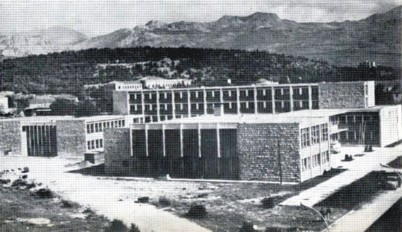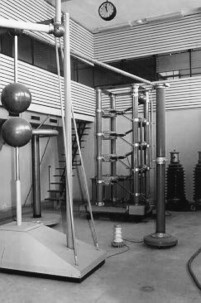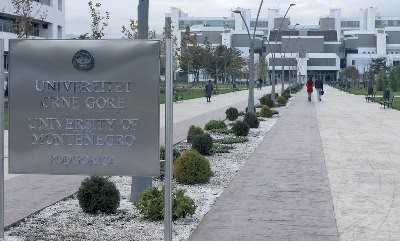Establishment and Development
During the 1961/62. school year began with the work the Department of the Belgrade Faculty of Electrical Engineering in Titograd, acknowledging the very expressed requirements for highly-educated technical staff in Montenegro. This start of classes is officialy taken as the beginning year of the electrical engineering studies, and technique in general, in Montenegro (1961). The initiator of these studies is Montenegrin Electric Enterprise in collaboration with the Executive Council of the People's Republic of Montenegro, and with the generous help of the Faculty of Electrical Engineering, University of Belgrade.
National Assembly of the Republic of Montenegro, at its session on November 12, 1962, passed a decree promulgating the Law on the Establishment of the Faculty of Engineering in Titograd, then with one electrical department. Therefore, 12th November is celebrated as the Day of Electrical Engineering in Podgorica.

Teaching classes for the first year of studies was organized and carried out in the gym of the secondary technical school of Civil engineering. Only since the 1964/65 school year, it begans with teaching in the partially completed new building of the Faculty, in which the Faculty has remained for more than twenty years.
Since the school year 1963/64 the Electrical Department was constituted, which continues the work of previously established Department, and starting from 1977/78 school year the studies at the Department of Electronics have began. By forming SOUR Technical Faculty in 1978, the Labour Society Electrical Engineering Titograd is constituted as a separate legal entity. Taking into account the great interest of young people and the needs of the society, the Faculty has opened the third study programme in 1997/98., the Higher school of computer engineering in two-year programs.

Selfless help and full involvement of colleagues from Faculty of Electrical Engineering in Belgrade, with a large and permanent support of society led to the formation of nowdays respected and esteemed institution. Comprehensive support to its development, the Faculty received from the faculties of electrical engineering in the region, mainly from Zagreb, Ljubljana and Sarajevo.
Nowdays, Faculty of Electrical Engineering (FEE) in Podgorica represents a modern educational and scientific institution that has in recent years made a huge contribution to the development of other technical, mathematical and physical sciences and related institutions in Montenegro. FEE established a base for the development of: Mechanical, Metallurgy and Civil Engineering, and the Institute of Mathematics and Physics (now the Faculty of Natural Sciences and Mathematics) and the Institute for Technical Research.
Meanwhile, the Faculty of Electrical Engineering in 1974, has become one of the ten founding members of the University "Veljko Vlahovic" in Titograd, University of Montenegro today.
Although the individual courses in graduate school, in cooperation with the Faculty of Electrical Engineering in Belgrade, have started since 1966, only after comprehensive consideration of the needs, conditions and opportunities, personnel, laboratory equipment, library and other relevant content, in 1991 it was started with permanent graduate studies. Through this, the Faculty has significantly amended its offer for improvement and training of a large number of interested electrical engineers.
The adoption of “Law on University” at 2003 the Faculty becomes an organizational unit of the integrated University, and Faculty continues to operate under the name "University of Montenegro - Faculty of Electrical Engineering in Podgorica."
Today, the Faculty of Electrical Engineering in Podgorica represents the leading research institution in Montenegro, which develops an intensive educational, scientific and segment of cooperation with the economy. In the process of reorganization, the teaching programs are modernized, and are now organized in three levels of studies, according to 3 + 2 + 3 study model. Three-year basic studies are organized in two academic and an applied degree program. Academic study program Power and Control systems in the sixth semester contains two optional modules: Power systems and Control systems and industrial electrical engineering. The final semester of undergraduate studies, academic study program Electronics, Telecommunications and Computer engineering has three optional modules: Electronics, Telecommunications and Computer engineering. In the undergraduate study program Applied computer engineering two optional modules are realized: Software Engineering and Computer Engineering. Master studies are organized through five academic study programs: Power Systems, Control systems and industrial electrical engineering, Electronics, Telecommunications and Computer engineering, and the applied study program Applied computer engineering. The Faculty also organizes three-year doctoral studies in Electrical engineering.
Faculty of Electrical Engineering in Podgorica is particularly known for its research work. The Faculty has implemented a multitude of research projects financed from national funds, EU funds, funds of NATO and bilateral cooperation. In 2014 Faculty received the status of the first Center of Excellence in Montenegro.
In order to promote and affirm the scientific research work, Faculty publishes ETF Journal of Electrical Engineering, which periodically publishes original scientific, professional and review papers in the field of electrical engineering. The journal is open to researchers and scientists from other universities.
The Faculty pays particular attention to cooperation with the economic environment, thus having that the Faculty is leader of many development and professional projects. Thanks to the successful cooperation, today the teaching base of the Faculty consists of the most important companies in the field of electrical engineering: Montenegrin Electric Enterprise, Montenegrin Transmission System, Montenegrin electric power distribution system Telecom Montenegro, Terna Montenegro, the Agency for Telecommunications and Postal Services. In recent years, special attention is paid to cooperation with small companies through which the College intends to carry out the transfer of technology in the economic environment, as a result of intensive scentific-research and innovative work.
Today, the Faculty of Electrical Engineering is situated in hte building od] the Technical faculties, in which it has 3800 m2 of space, out of which: 775 m2 is cabinet space, 520 m2 is space for classrooms, 1 910 m2 is laboratory space and 570 m2 are common areas.

The Faculty has a lot of modern equipped laboratories and computer classrooms, which are regularly renewed thanks to the implementation of big national and international projects, as well as to the intensive cooperation with the business environment. Through the Center of Information System of the University of Montenegro and the Academic Network of Montenegro, the Faculty is involved in the global academic network and Internet.
The successful development of the Faculty of Electrical Engineering is strongly contributed by many generations of our students. Graduate students of electrical engineering are carriers of development of the sector of power systems and the information and communication sector in Montenegro, in which over 95% of the employed in the field of electrical engineering are former students of the Faculty of Electrical Engineering in Podgorica.

